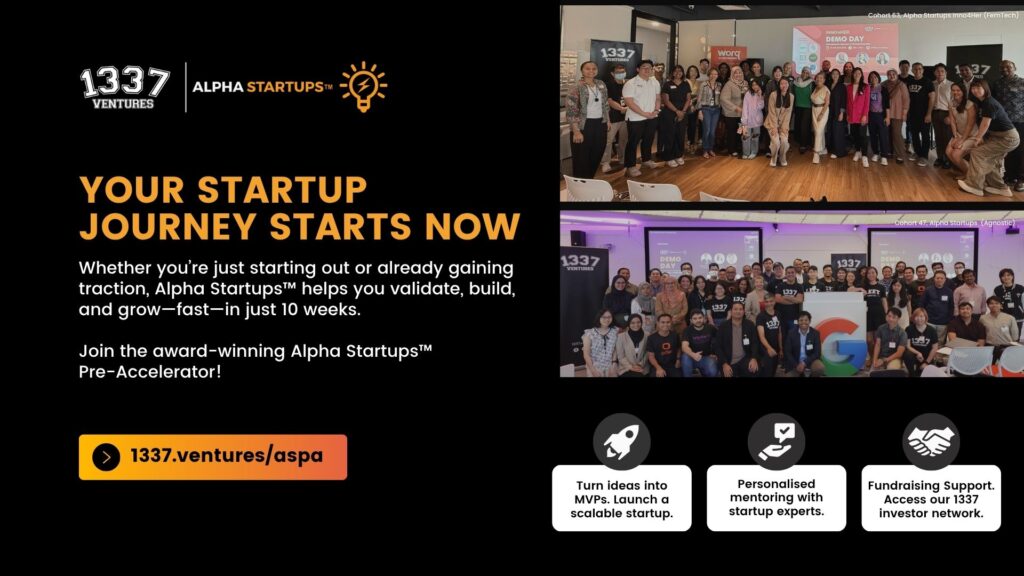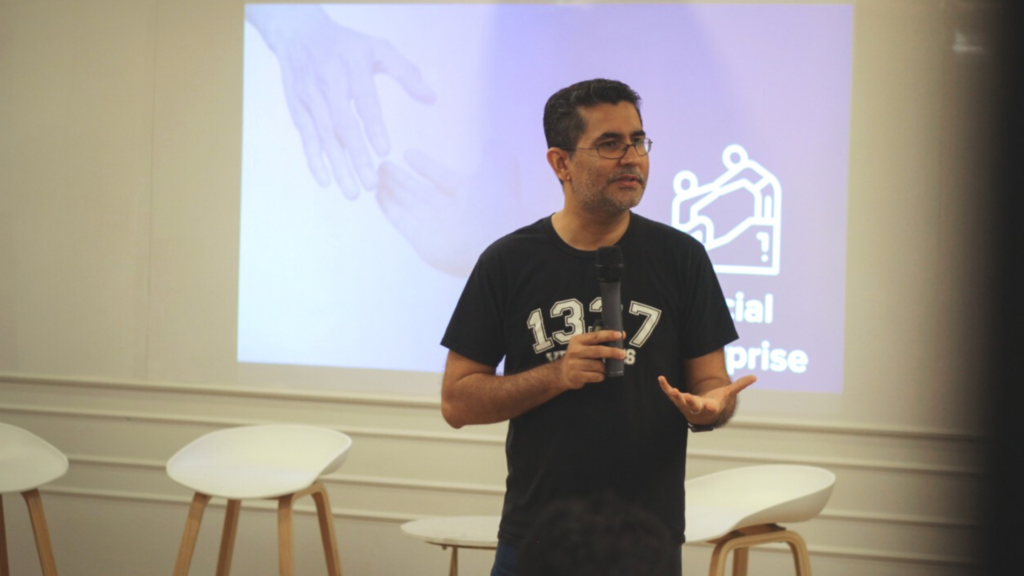
Are you an ambitious startup founder exploring the cutting-edge AI startup space? Whether you’re shaping a groundbreaking idea or diligently building your Minimum Viable Product (MVP), the journey of Laminar offers invaluable, real-world lessons on what it truly takes to build, validate, and scale an AI startup that genuinely solves real-world problems. During our recent insightful webinar, “Building an AI Startup: The Laminar Journey” hosted by 1337 Ventures as a pivotal part of the Alpha Startups™ Pre-Accelerator, Joshua Teh, the visionary Founder and CEO of Laminar, generously shared his compelling story. He detailed how he transformed initial concepts and significant pivots into a thriving AI solution provider that tackles real business challenges.
Watch the recording of Building an AI Startup: The Laminar Journey on YouTube.
From leveraging early AI hype to focusing on deep client problems, and from building an adaptable AI talent team to navigating data privacy, Joshua’s entrepreneurial narrative is packed with practical, actionable insights. These are particularly vital for early-stage founders and ambitious AI entrepreneurs looking to crack the code to building a successful AI company. This deep dive will explore how to achieve AI innovation, create effective AI solutions, and ensure successful AI market entry and AI scalability.
5 Essential Lessons for Aspiring AI Startup Founders
Building an AI business isn’t just about advanced algorithms; it’s about understanding human problems and deploying intelligent tools to solve them. Here are five critical lessons gleaned from Laminar’s journey, offering a comprehensive guide for anyone venturing into the AI ecosystem.
1. Pivot Until You Find a Real Problem: Beyond the AI Hype
Many AI startups are born from the excitement of new technologies and through Generative AI. Laminar’s initial idea in late 2022/early 2023 was centered around leveraging ChatGPT with internal data. However, as the novelty diminished and Large language models (LLMs) companies rolled out similar features, it became clear that the initial AI innovation lacked sustainable value. This led to a crucial pivot for Laminar.
Laminar’s current mission is to eliminate operational inefficiencies using AI, specifically automating the RFP (Request for Proposal) process for smarter procurement decisions. This shift highlights that while initial AI hype can open doors, the true mission of an AI startup must be rooted in solving a quantifiable, high-impact problem. It’s about converting initial interest into paying clients by delivering truly valuable AI solutions.
Key takeaway for founders: Don’t get lost in the AI hype. Your AI product needs to solve a specific, high-impact problem for which AI is the appropriate tool. Be prepared to pivot until you find this critical intersection of need and capability.
2. Talk to Customers Early and Relentlessly: Validating AI Solutions
One of the most important steps in building any startup, especially an AI startup, is customer interaction. For Laminar, talking to potential customers early was the “most important part of the journey,” even before incorporation or funding. This wasn’t about selling; it was about seeking critical feedback to validate or discard ideas.
Laminar’s approach involved asking about operational bottlenecks at a detailed level, rather than presenting their solution upfront. This allowed them to identify real pain points of their customers that their AI solutions could address effectively. Working with early clients, even if it meant extending beyond the initial scope (like developing a mobile app for Kopiku), provided deeper understanding of client problems and built trust.
Key takeaway for founders: Before you build, talk to your target customers. Understand their operational bottlenecks. This customer validation is crucial for ensuring your AI product addresses actual needs and leads to product-market fit.
3. Focus on Value and Follow the Money: Securing Early Wins and Funding Your AI Startup
In the AI business, demonstrating tangible value is paramount. Laminar learned to “follow the money” by focusing on clients willing to pay for solutions. This not only provided crucial early revenue but also helped identify further areas for improvement and high-impact problems worth solving. An example was working with a glove manufacturer to streamline internal processes, showcasing immediate value.
Laminar’s pricing strategy emphasizes that the perceived value to the customer must be higher than the cost for a purchase decision to be made. This client-centric approach helps in closing deals, which, as Joshua noted, often take longer than anticipated due to contractual processes. The ultimate signal for product-market fit goes beyond just paying customers; it involves analyzing why deals don’t close and refining your offering or pricing based on that feedback.
Key takeaway for founders: Lead with value in your AI solution. Focus on clients who are willing to pay, as this validates your offering and provides critical feedback for AI product development and pricing strategy.
4. Build a Hungry, Adaptable AI Talent Team: The Human Element of AI Innovation
In a fast-moving field like AI, building the right team is just as important as the tech. At Laminar, they prioritise hiring individuals who are hungry to learn and solve problems—even if they don’t have deep AI experience yet. Passion, adaptability, and a growth mindset matter more.
Addressing the fear of AI replacing jobs, Joshua believes AI will enhance experienced professionals, not replace them—especially in the near term. While some lower-level roles may shrink, experienced oversight and human judgment will remain critical. And for non-technical founders? Vision is everything. With AI, low-code, and vibe coding tools, anyone can now build, ship, and test MVPs faster than ever before.
Key takeaway for founders: Prioritize attitude and aptitude when building your AI team. Foster a culture of continuous learning and problem-solving to stay ahead in AI innovation.
5. Navigate Data Privacy and Competition: Building Defensibility in the AI Landscape
Data privacy is a critical concern for any AI startup, especially when dealing with sensitive business or procurement data. Laminar addresses this through approaches like on-premise solutions for highly sensitive clients and redacting sensitive information when using APIs. This commitment to AI ethics and data security is non-negotiable. When competing against tech giants like Google and OpenAI, AI startups need to build defensibility. Joshua suggests focusing on:
- Deep industry integration: Becoming indispensable to client industries.
- Owning distribution channels: Controlling how your AI solutions reach customers.
- Possessing unique data: Leveraging proprietary datasets to create distinct value.
To illustrate the importance of tailored, high-touch solutions, Joshua draws a compelling analogy: imagine a specialized restaurant versus a supermarket. At the restaurant, a skilled chef prepares your meal with care, drawing on expertise and delivering a curated experience. At a supermarket, you’re left to gather ingredients and cook on your own. Similarly, in the AI space, startups that act like the “chef”—offering end-to-end, personalized solutions—create far more value than those simply handing over tools. For startups scaling from custom GPTs, this means owning the codebase and building a custom site, rather than relying on wrappers that offer little control, differentiation, or usage insight.
Key takeaway for founders: Prioritize data privacy and cybersecurity from day one. Build defensibility for your AI business through deep integration, unique data, or strong distribution to compete effectively in the dynamic AI market.
Laminar’s Startup Journey: Problem-Solving, Agility & Real Impact in AI
Laminar growth is a masterclass for AI startup founders — grounded in deep problem understanding, shaped by relentless customer feedback, and strengthened by adaptability and strategic thinking. It’s a journey focused on solving real-world problems rather than chasing fleeting trends, delivering meaningful and lasting impact on business operations through AI.
Laminar is committed to eliminating operational inefficiencies using AI, making advanced technology accessible and valuable to organizations across diverse industries. They are transforming how businesses approach challenges by providing intelligent, data-driven AI solutions. Learn more about their transformative work: https://www.thelaminar.com
Ready to Launch Your AI Startup and Revolutionize Industries?

If you have a groundbreaking idea or an MVP for an AI solution and are ready to take the decisive leap into building an impactful AI business, then applying for the Alpha Startups™ Pre-Accelerator by 1337 Ventures could be your next strategic move. This highly curated 10-week hybrid accelerator programme to equip early-stage startup founders with essential tools and hands-on guidance.
You’ll validate your innovative ideas, gain crucial market traction, and build invaluable connections with experienced mentors, influential investors, and key industry leaders in the vibrant AI ecosystem. This is your unparalleled opportunity to accelerate your journey in Artificial Intelligence.

Shannon Chow, the Head of Marketing at 1337 Ventures. With 10-years of experience in marketing and advertising, Shannon is a specialist in integrated marketing, no-code/low-code tools, UI/UX, and branding. She mentors entrepreneurs in pitching & marketing. She’s passionate about self-development and women’s empowerment, Shannon strives to simplify the knowledge of starting a startup and ignite the spirit of entrepreneurship among youths.




